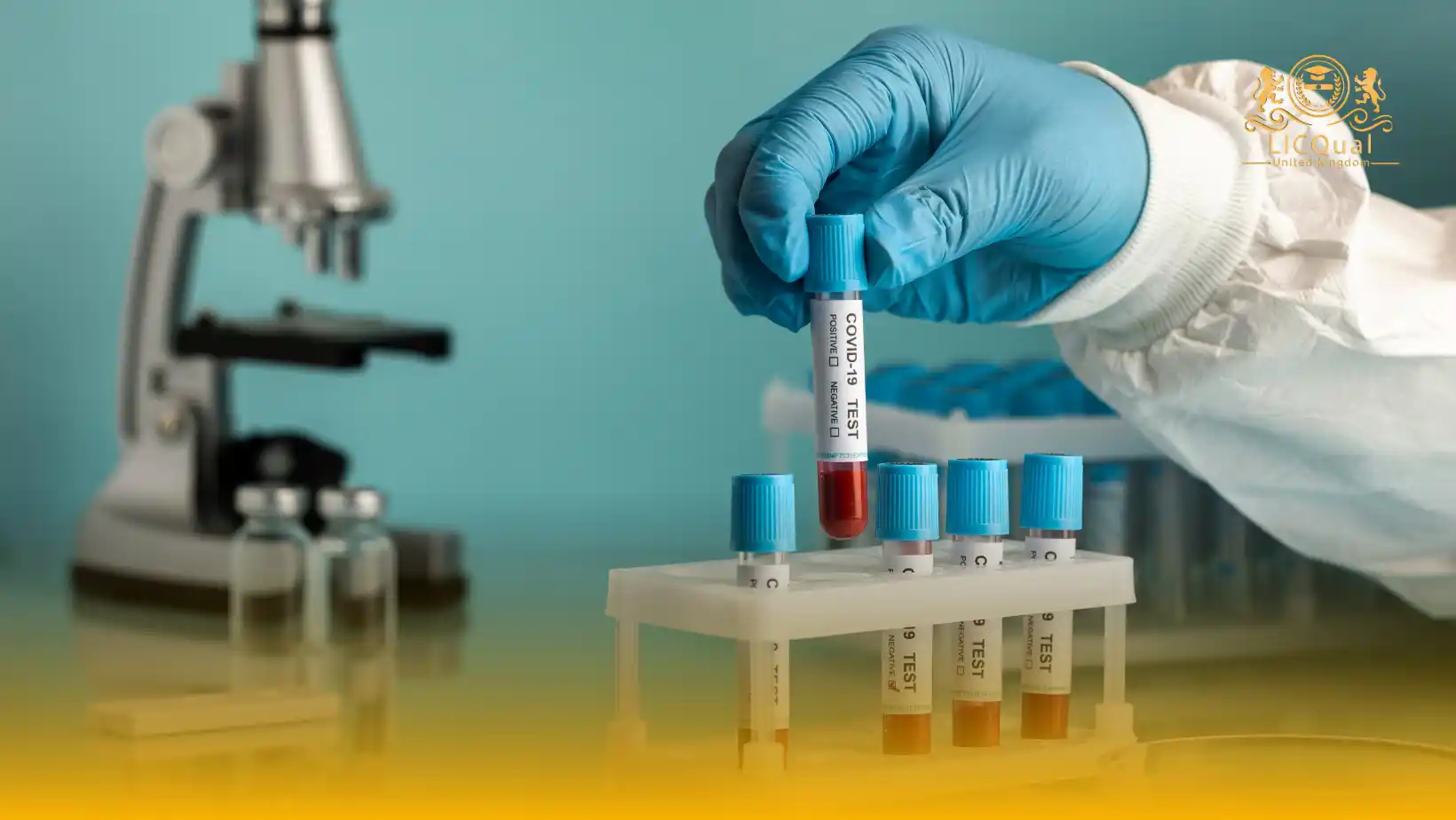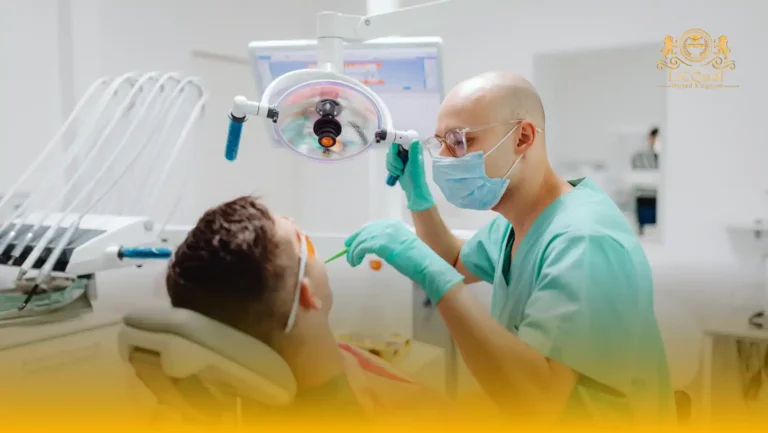The LICQual Level 7 Postgraduate Diploma in Clinical Pathology (PgDCP) is a prestigious qualification designed for experienced healthcare professionals seeking to advance their expertise in diagnostic medicine, laboratory practices, and clinical investigation. This programme is not intended for beginners but is tailored to support learners who already possess substantial knowledge and professional experience, enabling them to progress in their careers, broaden their clinical understanding, and strengthen their Continuing Professional Development (CPD).
Clinical pathology plays a critical role in modern healthcare, supporting the accurate diagnosis, monitoring, and treatment of diseases. This advanced diploma equips learners with in-depth knowledge of laboratory sciences, diagnostic methodologies, disease mechanisms, and evidence-based approaches to patient care. By integrating theoretical knowledge with practical applications, the qualification prepares learners for senior roles in healthcare institutions, laboratories, research organisations, and academia.
Centres delivering this qualification must ensure they have competent and qualified staff with the relevant expertise, alongside access to appropriate laboratory facilities, learning materials, and modern resources. This commitment ensures a high-quality learning experience that supports academic excellence and professional growth.
The PgDCP is internationally recognised and valued for its rigorous academic standards and industry relevance. Learners completing this diploma will enhance their professional credibility, expand career opportunities in clinical and diagnostic sciences, and contribute meaningfully to the advancement of healthcare services.
Course Overview
Qualification Title
LICQual Level 7 Postgraduate Diploma in Clinical Pathology (PgDCP)
Total Units
6
Total Credits
120
GLH
600
Qualification #
LICQ2200970
Qualification Specification
To enroll in the LICQual Level 7 Postgraduate Diploma in Clinical Pathology (PgDCP), applicants must meet the following criteria:
|
Qualification# |
Unit Title |
Credits |
GLH |
|---|---|---|---|
|
LICQ2200970-1 |
Advanced Principles of Clinical Pathology |
20 |
100 |
|
LICQ2200970-2 |
Laboratory Management and Quality Assurance |
20 |
100 |
|
LICQ2200970-3 |
Haematology and Blood Disorders |
20 |
100 |
|
LICQ2200970-4 |
Clinical Microbiology and Infectious Diseases |
20 |
100 |
|
LICQ2200970-5 |
Histopathology and Cytopathology |
20 |
100 |
|
LICQ2200970-6 |
Research Methods in Clinical Pathology |
20 |
100 |
By the end of this course, learners will be able to:
Unit 1: Advanced Principles of Clinical Pathology
Learners will be able to:
- Critically evaluate the fundamental principles and scope of clinical pathology.
- Analyse disease mechanisms at the cellular and molecular level.
- Assess the clinical significance of laboratory findings in diagnostic medicine.
- Apply advanced theoretical knowledge to real-world diagnostic and treatment scenarios.
Unit 2: Laboratory Management and Quality Assurance
Learners will be able to:
- Demonstrate knowledge of laboratory governance, safety, and ethical considerations.
- Apply quality assurance frameworks and international accreditation standards.
- Evaluate laboratory workflows for efficiency and accuracy.
- Implement strategies for continuous improvement and error reduction in laboratory practice.
Unit 3: Haematology and Blood Disorders
Learners will be able to:
- Critically analyse the pathophysiology of common and rare blood disorders.
- Interpret laboratory tests for accurate diagnosis of haematological conditions.
- Assess clinical management strategies for blood disorders, including transfusion medicine.
- Apply evidence-based approaches in haematological investigations and treatment.
Unit 4: Clinical Microbiology and Infectious Diseases
Learners will be able to:
- Identify and classify microbial pathogens relevant to human disease.
- Critically assess diagnostic methods for bacterial, viral, fungal, and parasitic infections.
- Evaluate antimicrobial resistance and its implications for public health.
- Apply infection control measures and laboratory strategies for outbreak management.
Unit 5: Histopathology and Cytopathology
Learners will be able to:
- Interpret histological and cytological findings for diagnostic accuracy.
- Critically evaluate tissue and cell changes in relation to disease progression.
- Apply advanced diagnostic techniques in cancer pathology and related fields.
- Integrate laboratory evidence into clinical decision-making.
Unit 6: Research Methods in Clinical Pathology
Learners will be able to:
- Demonstrate advanced research skills in clinical and diagnostic sciences.
- Critically evaluate scientific literature and evidence-based practice.
- Design and develop research projects relevant to clinical pathology.
- Apply statistical and analytical methods to interpret research data effectively.
The LICQual Level 7 Postgraduate Diploma in Clinical Pathology (PgDCP) is designed for a wide range of learners—whether you are an experienced healthcare professional, a beginner entering the medical field, or a career changer seeking new opportunities in diagnostic medicine. This internationally recognized postgraduate diploma provides advanced knowledge, practical skills, and accredited qualifications that open doors to global healthcare careers.
1. Experienced Medical Professionals
- Doctors seeking advanced training in diagnostic medicine and pathology
- Specialists aiming to strengthen laboratory interpretation skills
- Healthcare leaders preparing for senior roles in hospitals and clinics
- Professionals looking to earn CPD credits and international recognition
- Pathologists wanting to expand expertise in evidence-based patient care
2. Beginners Entering Healthcare and Pathology
- Fresh graduates interested in postgraduate qualifications in Clinical Pathology
- Students aiming to build strong foundations in laboratory sciences
- Learners seeking UK-accredited diplomas for global career opportunities
- Beginners who want structured, flexible learning with practical application
- Individuals motivated to gain advanced knowledge early in their careers
3. Career Changers Transitioning into Healthcare
- Professionals from other fields seeking a new career in medical diagnostics
- Individuals motivated to enter healthcare with internationally recognized qualifications
- Career changers looking for flexible postgraduate study options
- Learners seeking practical training in laboratory and clinical investigation
- Those aiming to secure stable, rewarding roles in healthcare institutions
4. International Healthcare Practitioners
- Doctors and medical technologists outside the UK seeking accredited qualifications
- Professionals aiming to meet international healthcare standards
- Learners interested in globally recognized postgraduate diplomas
- Practitioners seeking career mobility across countries and institutions
- Healthcare workers wanting to enhance diagnostic accuracy worldwide
5. Academic Researchers and Educators
- Researchers focusing on advanced pathology studies and laboratory sciences
- Educators seeking postgraduate credentials to strengthen teaching authority
- Medical academics aiming to publish or contribute to diagnostic research
- Professionals interested in evidence-based curriculum development
- Scholars looking to align with EEAT principles in healthcare education
6. Hospital and Laboratory Staff
- Laboratory technicians aiming to upgrade qualifications to postgraduate level
- Staff seeking advanced training in clinical investigation and diagnostics
- Healthcare workers preparing for leadership roles in labs and diagnostic centers
- Professionals wanting to improve patient outcomes through accurate testing
- Teams seeking internationally recognized CPD qualifications
7. Public Health and Diagnostic Medicine Specialists
- Public health professionals seeking advanced pathology knowledge
- Specialists aiming to integrate diagnostic medicine into patient care strategies
- Healthcare workers focusing on infectious diseases and emergency medicine
- Practitioners looking to strengthen evidence-based healthcare delivery
- Professionals preparing for senior roles in public health institutions
Approved centres delivering the LICQual Level 7 Postgraduate Diploma in Clinical Pathology (PgDCP) must ensure they meet the highest academic and professional standards. To provide learners with a high-quality educational experience, centres are required to have the following:
- Qualified Academic Staff
- Tutors, assessors, and trainers must hold relevant postgraduate qualifications in clinical pathology, medical sciences, or related fields.
- Staff should demonstrate significant professional experience in laboratory sciences, diagnostics, or healthcare.
- Laboratory and Learning Facilities
- Access to modern, fully equipped laboratories with the latest diagnostic and testing equipment.
- Availability of safe, hygienic, and compliant laboratory environments adhering to international quality and safety standards.
- Learning Resources
- Comprehensive teaching materials, case studies, and updated reference texts.
- Access to digital learning platforms, e-libraries, and research databases to support advanced study.
- Quality Assurance Systems
- Centres must have effective policies for internal quality assurance and assessment.
- Regular monitoring, feedback, and evaluation processes should be in place to maintain academic integrity.
- Support Services for Learners
- Guidance and mentoring from qualified staff throughout the programme.
- Administrative and academic support to ensure learners successfully achieve their qualification.
- Commitment to CPD and Professional Standards
- Centres must encourage staff and learners to engage in Continuing Professional Development (CPD).
- Regular updates to course materials and practices to reflect the latest developments in clinical pathology and healthcare.
Assessment and Verification
All units within this qualification are subject to internal assessment by the approved centre and external verification by LICQual. The qualification follows a criterion-referenced assessment approach, ensuring that learners meet all specified learning outcomes.
To achieve a ‘Pass’ in any unit, learners must provide valid, sufficient, and authentic evidence demonstrating their attainment of all learning outcomes and compliance with the prescribed assessment criteria. The Assessor is responsible for evaluating the evidence and determining whether the learner has successfully met the required standards.
Assessors must maintain a clear and comprehensive audit trail, documenting the basis for their assessment decisions to ensure transparency, consistency, and compliance with quality assurance requirements.







